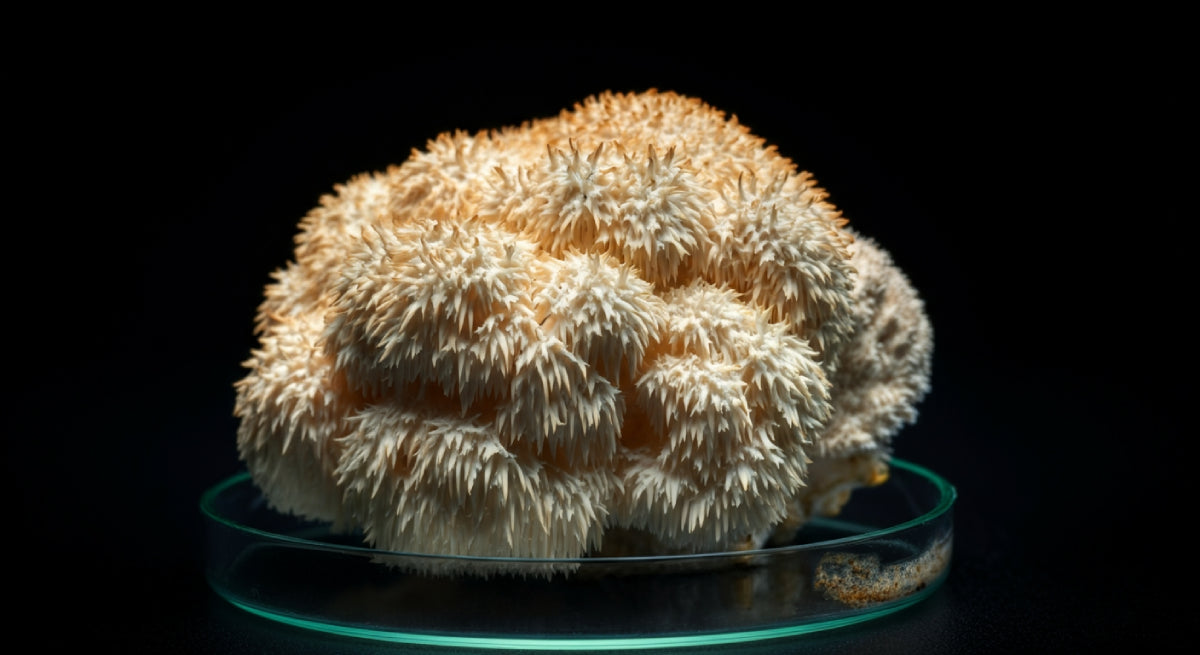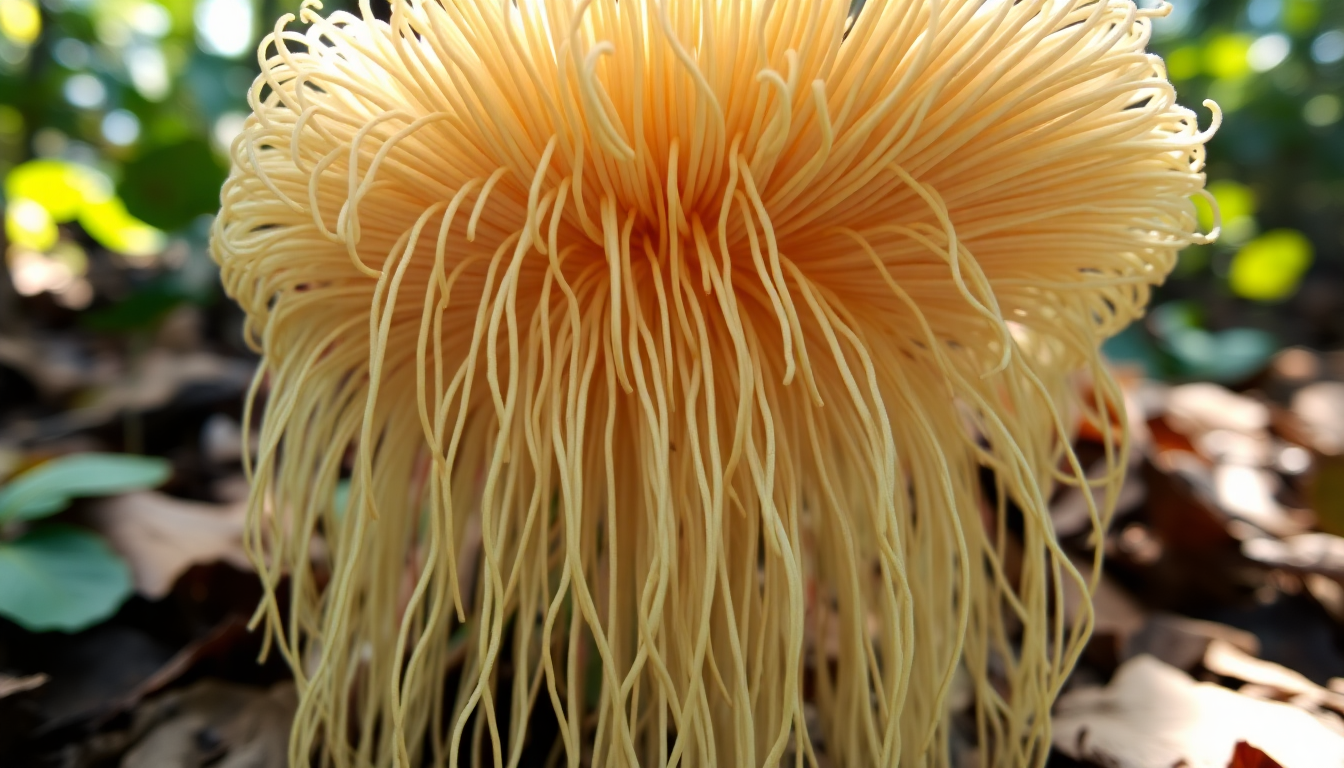Lions mane ADHD research has emerged as one of the most compelling areas of study in the functional mushroom and cognitive enhancement fields. As more individuals seek natural alternatives and complementary approaches to traditional ADHD management, Lion's Mane mushrooms (Hericium erinaceus) have garnered significant attention from researchers, healthcare providers, and those living with attention deficit hyperactivity disorder.
The intersection of Lions mane ADHD research represents a fascinating convergence of ancient traditional medicine and modern neuroscience. While traditional ADHD treatments primarily focus on stimulant medications and behavioral interventions, the potential cognitive-enhancing properties of Lion's Mane mushrooms offer a unique perspective on supporting attention, focus, and executive function through natural mechanisms.
Understanding the relationship between Lion's Mane mushrooms and ADHD symptoms requires examining both the complex neurobiological aspects of attention disorders and the remarkable neuroprotective and cognitive-enhancing compounds found within these distinctive fungi. This comprehensive exploration aims to provide evidence-based insights into how Lion's Mane might support individuals with ADHD while emphasizing the importance of professional medical guidance.
Understanding ADHD and Cognitive Challenges
ADHD Symptom Categories and Neurobiological Factors
Attention Deficit Hyperactivity Disorder affects millions of individuals worldwide, presenting unique challenges that impact daily functioning:
Primary ADHD Symptom Categories:
- Inattention symptoms: Difficulty sustaining attention, frequent distractibility, and problems with organization
- Hyperactivity symptoms: Excessive restlessness, difficulty sitting still, and constant movement
- Impulsivity symptoms: Acting without thinking, interrupting others, and difficulty waiting turns
- Executive function deficits: Problems with working memory, cognitive flexibility, and inhibitory control
- Emotional regulation challenges: Difficulty managing frustration, mood swings, and emotional sensitivity
Neurobiological Aspects of ADHD:
- Dopamine dysfunction: Altered dopamine pathways affecting reward processing and motivation
- Norepinephrine imbalances: Impact on attention regulation and arousal systems
- Prefrontal cortex differences: Structural and functional variations affecting executive functions
- Default mode network irregularities: Disrupted brain network connectivity during rest and focus
- Neurotransmitter communication: Impaired signaling between brain regions responsible for attention and impulse control
Current Treatment Approaches and Limitations
Traditional ADHD management typically involves multiple therapeutic modalities:
Conventional Treatment Methods:
- Stimulant medications: Methylphenidate and amphetamine-based drugs for symptom control
- Non-stimulant medications: Atomoxetine, guanfacine, and other alternatives for specific cases
- Behavioral therapy: Cognitive-behavioral interventions and skill-building approaches
- Educational accommodations: Modified learning environments and teaching strategies
- Lifestyle modifications: Exercise, sleep hygiene, and dietary interventions
Treatment Challenges and Limitations:
- Side effect concerns: Appetite suppression, sleep disturbances, and growth impacts in children
- Individual response variation: Significant differences in medication effectiveness between individuals
- Long-term dependency: Concerns about extended use of stimulant medications
- Access and cost barriers: Limited availability of comprehensive ADHD care in many regions
- Stigma and social factors: Societal attitudes affecting treatment acceptance and compliance

Lion's Mane Mushrooms: Neuroprotective Powerhouse
Bioactive Compounds and Neurological Benefits
Lion's Mane mushrooms contain unique compounds that specifically target neurological health and cognitive function:
Primary Neuroprotective Compounds:
- Hericenones: Small molecules that can cross the blood-brain barrier and stimulate nerve growth factor (NGF) production
- Erinacines: Larger compounds that promote neuronal growth and differentiation
- Beta-glucans: Polysaccharides that support immune function and may influence brain inflammation
- Potassium and zinc: Essential minerals for proper neurological function and neurotransmitter synthesis
- Amino acids: Building blocks for neurotransmitter production and brain protein synthesis
Neurological Mechanisms of Action:
- Nerve growth factor stimulation: Promoting the growth and maintenance of neurons throughout the nervous system
- Neuroplasticity enhancement: Supporting the brain's ability to form new neural connections and adapt
- Myelin sheath protection: Maintaining the protective covering around nerve fibers for optimal signal transmission
- Antioxidant activity: Protecting brain cells from oxidative stress and age-related damage
- Anti-inflammatory effects: Reducing neuroinflammation that may contribute to cognitive dysfunction
Research on Cognitive Enhancement and Memory
Scientific studies have revealed Lion's Mane's potential for supporting various aspects of cognitive function:
Clinical Research Findings:
- Memory improvement studies: Japanese research showing enhanced cognitive function in elderly participants
- Mild cognitive impairment trials: Improvements in cognitive assessment scores over placebo groups
- Animal studies: Significant improvements in spatial memory and recognition tasks in rodent models
- Neuroprotective research: Evidence of protection against neurodegenerative processes
- Neurogenesis promotion: Studies indicating increased production of new brain cells
Cognitive Domains Affected:
- Working memory: Enhanced ability to hold and manipulate information temporarily
- Processing speed: Improved rate of information processing and mental flexibility
- Attention span: Extended ability to maintain focus on tasks and resist distractions
- Executive function: Better planning, decision-making, and problem-solving abilities
- Learning capacity: Enhanced ability to acquire and retain new information
Lions Mane ADHD Research: Current Evidence and Potential Mechanisms
Emerging Research on ADHD Symptom Support
While specific Lions mane ADHD clinical trials remain limited, related research suggests promising potential:
Relevant Research Areas:
- Cognitive enhancement studies: Research demonstrating improved attention and focus in healthy individuals
- Neurotransmitter modulation: Evidence of Lion's Mane's influence on dopamine and norepinephrine systems
- Executive function improvement: Studies showing enhanced planning and decision-making abilities
- Emotional regulation support: Research on mood stabilization and stress response improvement
- Neuroprotective effects: Evidence of brain protection that may benefit ADHD-related neurological differences
Mechanistic Connections to ADHD:
- Dopamine pathway support: Lion's Mane compounds may help optimize dopamine function, crucial for ADHD management
- Prefrontal cortex enhancement: Potential improvements in brain regions most affected by ADHD
- Neuroplasticity promotion: Supporting the brain's ability to develop new coping strategies and neural pathways
- Inflammation reduction: Addressing neuroinflammation that may contribute to ADHD symptoms
- Stress response modulation: Helping manage the stress and anxiety often associated with ADHD
Anecdotal Reports and User Experiences
While not scientifically validated, user reports provide insights into potential benefits:
Commonly Reported Benefits:
- Improved focus duration: Users report being able to sustain attention for longer periods
- Enhanced mental clarity: Reduced brain fog and improved cognitive sharpness
- Better emotional regulation: More stable moods and reduced irritability
- Increased productivity: Enhanced ability to complete tasks and meet deadlines
- Reduced anxiety: Calmer mental state that supports better focus and decision-making
Reported Usage Patterns:
- Daily supplementation: Most users report consistent daily use for optimal benefits
- Gradual onset: Benefits typically reported after 2-4 weeks of regular use
- Dose-dependent effects: Higher doses often associated with more pronounced benefits
- Individual variation: Significant differences in response between different users
- Combination strategies: Many users combine Lion's Mane with other cognitive enhancers

Dosage Guidelines and Administration Protocols
General Dosing Recommendations for Cognitive Support
Lion's Mane dosing for cognitive enhancement varies based on product type and individual needs:
Standard Dosage Ranges:
- Whole mushroom powder: 1-3 grams daily for general cognitive support
- Standardized extracts: 500-1000 mg daily of concentrated extract (10:1 or 15:1 ratio)
- Dual-extracted products: 300-600 mg daily of full-spectrum extracts
- Capsule supplements: Follow manufacturer recommendations, typically 1-3 capsules daily
- Liquid tinctures: 1-3 ml daily or as directed by product labeling
ADHD-Specific Considerations:
- Starting doses: Begin with lower doses (500 mg extract or 1 gram powder) to assess tolerance
- Gradual increases: Increase dosage slowly over 2-3 weeks to find optimal levels
- Timing strategies: Morning administration for daytime focus or divided doses for sustained effects
- Consistency importance: Daily use appears more beneficial than occasional supplementation
- Individual optimization: Work with healthcare providers to determine optimal dosing
Timing and Administration Strategies
Optimizing when and how to take Lion's Mane can enhance its cognitive benefits:
Optimal Timing Approaches:
- Morning administration: Taking with breakfast for all-day cognitive support
- Pre-work or study sessions: 30-60 minutes before activities requiring intense focus
- Divided dosing: Splitting daily dose between morning and early afternoon
- Empty stomach vs. with food: Some users report better absorption on empty stomach, others prefer with meals
- Avoiding late-day doses: Preventing potential sleep disruption from enhanced alertness
Administration Methods:
- Capsule consistency: Most convenient method for precise dosing and routine establishment
- Powder mixing: Blending into smoothies, coffee, or other beverages for easier consumption
- Tea preparation: Brewing Lion's Mane powder or dried mushrooms for traditional consumption
- Food integration: Adding powder to meals, yogurt, or other foods for seamless incorporation
- Sublingual tinctures: Under-tongue administration for potentially faster absorption
Safety Profile and Interaction Considerations
General Safety and Tolerance
Lion's Mane mushrooms have an excellent safety profile with minimal reported adverse effects:
Safety Characteristics:
- Generally well-tolerated: Most users experience no adverse effects
- Low toxicity profile: No significant toxicity reported in research studies
- Natural origin: Whole food supplement with long history of culinary use
- Non-addictive: No dependency or withdrawal issues reported
- Minimal side effects: Rare reports of mild digestive upset or skin reactions
Rare Potential Side Effects:
- Digestive sensitivity: Occasional stomach discomfort, particularly with higher doses
- Skin reactions: Very rare reports of rash or itching in sensitive individuals
- Respiratory symptoms: Extremely rare cases of breathing difficulties (likely allergic reactions)
- Fatigue changes: Some users report initial fatigue that typically resolves with continued use
- Mood changes: Rare reports of mood alterations, particularly in sensitive individuals
ADHD Medication Interactions and Precautions
Individuals with ADHD taking prescription medications should consider potential interactions:
Stimulant Medication Considerations:
- Additive effects: Potential for enhanced stimulation when combined with stimulant medications
- Dosage adjustments: May need to modify conventional medication doses under medical supervision
- Monitoring requirements: Increased attention to heart rate, blood pressure, and sleep patterns
- Timing coordination: Spacing Lion's Mane and stimulant doses to avoid excessive stimulation
- Professional oversight: Essential to involve prescribing physicians in supplementation decisions
Non-Stimulant Medication Interactions:
- Atomoxetine compatibility: Generally considered safe but monitoring recommended
- Antidepressant interactions: Potential interactions with SSRIs or other mood medications
- Blood pressure medications: Possible interactions requiring monitoring
- Anti-anxiety medications: Potential for altered effectiveness of anxiety treatments
- Sleep medications: May affect the need for or effectiveness of sleep aids
Special Populations and Precautions
Certain groups require additional consideration when using Lion's Mane:
Children and Adolescents:
- Limited research: Insufficient data on safety and effectiveness in pediatric populations
- Developmental considerations: Potential effects on developing nervous systems unknown
- Dosage modifications: Lower doses typically recommended when used under medical supervision
- Parental supervision: Requires careful monitoring and professional guidance
- Alternative approaches: Consider other interventions before supplementation in young people
Pregnancy and Breastfeeding:
- Insufficient safety data: Limited research on use during pregnancy and lactation
- Precautionary avoidance: Generally recommended to avoid during these periods
- Professional consultation: Essential to discuss with healthcare providers
- Risk-benefit assessment: Weighing potential benefits against unknown risks
- Alternative strategies: Focus on proven safe interventions during these periods
Quality Selection and Product Evaluation
Identifying High-Quality Lion's Mane Products
The Lion's Mane supplement market varies significantly in quality and potency:
Quality Indicators:
- Organic certification: Products free from pesticides and synthetic chemicals
- Third-party testing: Independent verification of purity, potency, and contaminant levels
- Extraction methods: Clear information about hot water, alcohol, or dual extraction processes
- Standardization: Products standardized for hericenones and erinacines content
- Certificate of Analysis (COA): Detailed testing results available from manufacturers
Red Flags to Avoid:
- Unusually low prices: Products significantly cheaper than market average often indicate poor quality
- Missing testing information: Lack of COAs or third-party verification
- Vague labeling: Unclear extraction ratios or active compound concentrations
- No organic certification: Potential exposure to harmful chemicals and contaminants
- Unverified health claims: Products making unrealistic or unsupported therapeutic claims
Reputable Brands and Sourcing Considerations
Selecting trustworthy Lion's Mane suppliers for ADHD support:
Recommended Sourcing Criteria:
- Established companies: Brands with long track records in medicinal mushroom production
- Transparent practices: Open about growing methods, extraction processes, and testing protocols
- Scientific backing: Products developed with research input and scientific validation
- Healthcare professional endorsements: Recommendations from qualified practitioners
- Customer feedback: Positive reviews from verified purchasers over extended periods
Geographic and Supply Chain Factors:
- Cultivation regions: Products from areas with optimal growing conditions for Lion's Mane
- Organic farming practices: Sustainable cultivation methods without harmful chemicals
- Processing facilities: GMP-certified manufacturing with proper quality controls
- Supply chain transparency: Clear tracking from cultivation through final product
- Regulatory compliance: Products meeting relevant supplement manufacturing standards

Integration with Conventional ADHD Treatment
Complementary Approach Strategies
Lion's Mane can potentially complement traditional ADHD treatments when used appropriately:
Integration Principles:
- Additive benefits: Supporting conventional treatments rather than replacing them
- Gradual introduction: Starting Lion's Mane while maintaining stable medication regimens
- Professional oversight: Involving healthcare providers in supplementation decisions
- Monitoring protocols: Tracking both benefits and potential interactions
- Flexible adjustments: Modifying approaches based on individual responses
Combination Strategies:
- Medication optimization: Potentially allowing for lower stimulant doses under medical supervision
- Side effect mitigation: Addressing medication-related issues like appetite suppression or sleep problems
- Cognitive enhancement: Boosting areas where conventional treatments may be insufficient
- Long-term support: Providing ongoing neuroprotective benefits beyond symptom management
- Holistic wellness: Supporting overall brain health and cognitive resilience
Working with Healthcare Providers
Effective communication with medical professionals enhances safety and outcomes:
Healthcare Provider Communication:
- Full disclosure: Informing all healthcare providers about Lion's Mane use
- Documentation: Keeping detailed records of products used, dosages, and observed effects
- Regular monitoring: Establishing protocols for tracking relevant health markers
- Collaborative decision-making: Involving providers in dosage and timing decisions
- Emergency preparedness: Ensuring medical professionals know about supplement use
Monitoring and Assessment:
- Symptom tracking: Using standardized ADHD rating scales to measure changes
- Cognitive testing: Periodic assessment of attention, memory, and executive function
- Medication effectiveness: Monitoring whether conventional treatments remain optimal
- Side effect surveillance: Watching for any adverse reactions or interactions
- Quality of life measures: Assessing overall functioning and well-being improvements
Lifestyle Integration and Optimization Strategies
Creating Comprehensive Cognitive Support Protocols
Maximizing Lion's Mane benefits through holistic lifestyle approaches:
Synergistic Lifestyle Factors:
- Regular exercise: Physical activity that supports neuroplasticity and cognitive function
- Quality sleep: Consistent sleep schedules that support brain restoration and consolidation
- Stress management: Meditation, mindfulness, and stress-reduction techniques
- Nutritious diet: Brain-healthy foods that complement Lion's Mane's cognitive benefits
- Cognitive training: Brain exercises and activities that challenge and develop mental skills
Environmental Optimization:
- Distraction reduction: Creating environments that support focus and attention
- Natural light exposure: Optimizing circadian rhythms for better cognitive function
- Noise management: Using appropriate sound environments for concentration
- Organization systems: Implementing structures that support executive function
- Technology boundaries: Managing digital distractions and screen time
Combining with Other Natural Cognitive Enhancers
Strategic combinations that may enhance Lion's Mane effectiveness:
Complementary Supplements:
- Omega-3 fatty acids: Supporting brain structure and anti-inflammatory effects
- Magnesium: Mineral support for neurological function and stress management
- B-complex vitamins: Supporting neurotransmitter synthesis and energy metabolism
- Rhodiola rosea: Adaptogenic herb for stress resilience and mental performance
- Bacopa monnieri: Traditional herb for memory and cognitive enhancement
Natural Nootropic Stacks:
- Mushroom combinations: Pairing Lion's Mane with other cognitive mushrooms like Cordyceps
- Herbal synergies: Combining with adaptogenic herbs for comprehensive support
- Amino acid support: Including L-theanine or tyrosine for neurotransmitter support
- Antioxidant enhancement: Adding compounds that protect against oxidative stress
- Choline sources: Supporting acetylcholine production for memory and attention
Future Research Directions and Emerging Applications
Current Research Gaps and Opportunities
The Lions mane ADHD research field offers numerous opportunities for advancement:
Priority Research Areas:
- Randomized controlled trials: Specific studies on Lion's Mane for ADHD symptoms
- Pediatric research: Safety and effectiveness studies in children and adolescents
- Dosage optimization: Research determining optimal dosing protocols for cognitive enhancement
- Long-term studies: Investigating sustained use effects and safety profiles
- Mechanistic research: Understanding exact pathways through which Lion's Mane affects ADHD symptoms
Emerging Investigation Areas:
- Biomarker studies: Identifying measurable indicators of Lion's Mane effectiveness
- Personalized medicine: Developing protocols based on individual genetic and metabolic factors
- Combination therapies: Research on optimal combinations with conventional treatments
- Prevention research: Investigating potential for preventing ADHD symptom progression
- Quality of life studies: Measuring broader impacts beyond symptom reduction
Innovation in Product Development
The Lion's Mane industry continues evolving with new technologies and applications:
Advanced Formulations:
- Targeted delivery systems: Enhanced bioavailability through specialized delivery methods
- Standardized compounds: Products with guaranteed levels of active hericenones and erinacines
- Sustained-release formulations: Extended-release products for consistent cognitive support
- Combination products: Formulas specifically designed for ADHD symptom support
- Personalized formulations: Products tailored to individual cognitive profiles and needs
Technology Integration:
- Digital health monitoring: Apps and devices that track cognitive improvements
- Precision dosing: Technology-assisted optimization of dosing protocols
- Research participation: Platforms enabling users to contribute to research studies
- Outcome tracking: Sophisticated systems for measuring and reporting benefits
- Community support: Online platforms for sharing experiences and best practices
Real-World Applications and Success Stories
Implementation Strategies for Different ADHD Presentations
Tailoring Lion's Mane use to specific ADHD symptom patterns:
Inattentive Type ADHD:
- Focus-specific protocols: Higher doses timed before activities requiring sustained attention
- Gradual introduction: Starting with lower doses to avoid overstimulation
- Consistency emphasis: Daily use to build and maintain cognitive improvements
- Environmental support: Combining with attention-supporting lifestyle modifications
- Progress tracking: Monitoring improvements in attention span and task completion
Hyperactive-Impulsive Type ADHD:
- Calming combinations: Pairing with L-theanine or other calming compounds
- Timing considerations: Morning use to support all-day impulse control
- Physical activity integration: Combining with exercise for optimal results
- Stress management: Emphasizing Lion's Mane's stress-reduction benefits
- Behavioral support: Using alongside behavioral modification strategies
Combined Type ADHD:
- Comprehensive protocols: Addressing both attention and hyperactivity symptoms
- Flexible dosing: Adjusting based on daily symptom variations
- Multi-modal approaches: Combining with various therapeutic interventions
- Regular assessment: Monitoring multiple symptom domains for comprehensive improvement
- Individualized strategies: Tailoring approaches to specific symptom profiles
Age-Specific Considerations and Protocols
Adapting Lion's Mane use across different life stages:
Adult ADHD Applications:
- Career support: Using Lion's Mane to enhance workplace performance and productivity
- Academic applications: Supporting adult learners returning to education
- Relationship benefits: Improved emotional regulation supporting interpersonal relationships
- Life management: Enhanced executive function for daily life organization
- Long-term wellness: Supporting cognitive health and preventing age-related decline
Elderly ADHD Management:
- Medication interactions: Careful consideration of age-related medication sensitivities
- Cognitive preservation: Supporting overall cognitive health in aging adults with ADHD
- Dosage modifications: Lower doses typically appropriate for older adults
- Comprehensive monitoring: More frequent assessment of effects and side effects
- Quality of life focus: Emphasizing functional improvements and well-being
Conclusion: Navigating the Future of Lions Mane ADHD Support
The emerging field of Lions mane ADHD research represents a promising frontier in integrative approaches to attention and cognitive enhancement. While definitive clinical trials specifically examining Lion's Mane for ADHD symptoms remain limited, the substantial body of research on this remarkable mushroom's cognitive benefits provides a compelling foundation for its potential therapeutic applications.
The unique neuroprotective and cognitive-enhancing properties of Lion's Mane mushrooms offer hope for individuals seeking natural approaches to complement traditional ADHD management strategies. From supporting nerve growth factor production to enhancing neuroplasticity and potentially optimizing neurotransmitter function, Lion's Mane addresses multiple aspects of brain health that are relevant to ADHD symptom management.
However, the path forward requires careful navigation, professional guidance, and realistic expectations. While anecdotal reports and preliminary research suggest significant potential, the complexity of ADHD as a neurodevelopmental condition demands comprehensive, evidence-based approaches that prioritize safety and efficacy. The integration of Lion's Mane into ADHD management should always occur under appropriate medical supervision, particularly when conventional treatments are involved.
As research continues to evolve and our understanding of Lions mane ADHD connections deepens, these remarkable fungi may play increasingly important roles in comprehensive ADHD support strategies. The future holds promise for more targeted, personalized approaches that leverage Lion's Mane's unique properties while respecting the individual nature of ADHD presentations and treatment responses.
For those considering Lion's Mane as part of their ADHD management approach, the emphasis should remain on quality products, professional guidance, realistic expectations, and comprehensive lifestyle strategies that support overall brain health and cognitive resilience. Through thoughtful integration and continued research, Lion's Mane mushrooms may indeed contribute to more effective, holistic approaches to ADHD support and cognitive optimization.














Share:
Lion’s Mane Mushroom Recipe: A Delicious Culinary Delight
How to Cook Lion's Mane Mushroom Perfectly